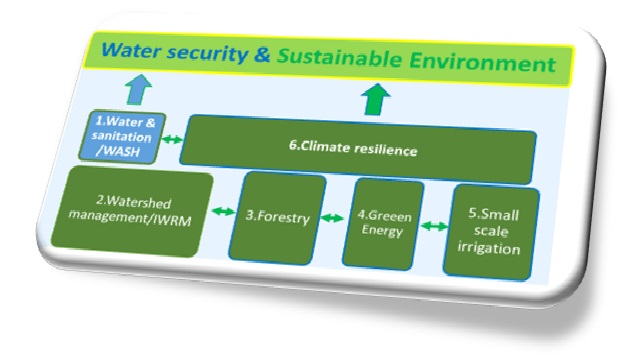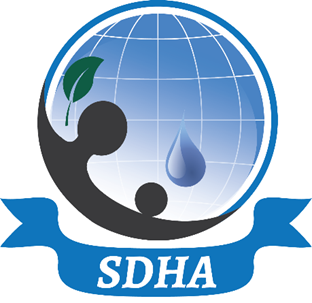

See facts sheets details and global trends
Poverty, environment and disaster management are interconnected phenomena. Water as a natural resource is a critical resource needed by all humans and nature to sustain the biodiversity. Water security means meeting human security (Water and sanitation), nature (ecosystem) and agriculture for food production. To this end, we subscribe to this concept “Some water for all”. Water security is the back bone of the national economy and community livelihoods. Water allocation versus water use request calls a particular attention, wise and reasonable actions for sustainable water management.
Rwanda Priority actions for climate resilience
Intensification of extreme weather events such as floods and landslides. These are already recurrent in Rwanda but will be exacerbated and be significantly more damaging due to climate change, posing a bigger threat to human lives and security, crops, livestock, and infrastructure.
Increased rainfall variability could lengthen drought periods, especially in the eastern province.
Models made for Rwanda (REMA vulnerability index, 2015) indicate that Rwanda could lose over 1% of its GDP each year due to climate change related losses by 2030, and an even greater proportion thereafter (this estimate does not even factor in losses due to floods, which would raise GDP losses beyond the 1% annual figure.
The logic model for Water Security and Sustainable Environment has adherence to the macro view the Theory of change for SDHA

It is made of 5 comprehensive programmatic areas aiming at solving the critical issues faced by beneficiary communities which are: Access to clean water and sanitation, land and ecosystem degradation, water scarcity for agriculture and environment due to effects of climate change.
To this end, the national strategy for climate resilience has put forward the four programmatic areas which are: Water Security for All, Resilient Human Settlements, Stable and Sustainable Landscapes.
SDHA approach for Water security and community Resilience to climate change
1-Access to clean water and sanitation WASH
SDHA commits to improve access to clean water and sanitation for disadvantaged communities to join the Government effort of full access by all Rwandans by 2018. SHDA WASH intervention includes both hard infrastructure, and soft (community mobilization) for ownership and sustainability. See expertise of SDHA IN WASH
2-Sustainable land use management:
SDHA invests in piloting action at community and household level combining small scale irrigation, Agroforestry and afforestation, erosion control and climate resilient agriculture *(see smart agriculture/ Link it with sustainable Agriculture and liverihoods… Smart agric) in attempt to empower the community for coping to adverse effects of climate change affecting their lives)
3-Watershed Management and IWRM
The watershed management is very crucial to face the climate change at local level and implies a combination of different disciplines and effective involvement of stakeholders. The Watershed management is including local water security and climate resilience of the concerned communities. Policies and national strategies are to be domesticated at local communities. In this line therefore,
SDHA seeks to involve communities to take action in Integrated Water Resource Management (IWRM) planning and implementation. The Key activities at community level are: community mobilization and trainings, erosion control, agroforestry and afforestation of the necked space.
4-Access to energy
Rural communities and city households rely on firewood and Charcoal respectively as main energy for cooking. It is critically important to reverse the trend to save tree cutting and biomass. SDHA mobilizes and supports communities to use alternative energy practices namely: Green energy (Biogas), energy saving cook stoves to save environment and enhance resilience to climate change.
